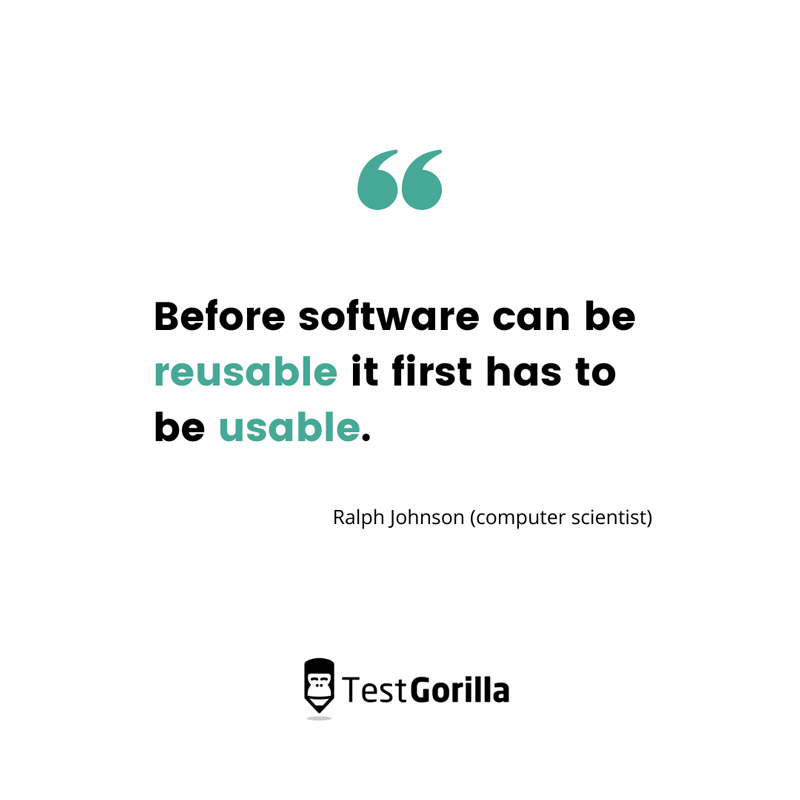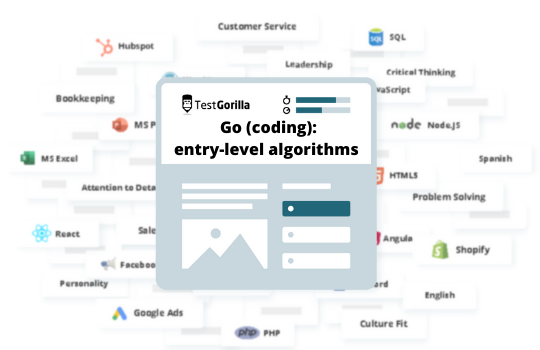15 critical junior developer interview questions to hire the best candidate
Hiring a junior (jr.) developer isn’t always an easy task, especially if you are not familiar with the role yourself. That’s why we’ve come up with a list of jr. developer interview questions to help inspire you.
We’ll take a look at the top skills a jr. developer needs, and how to test their abilities with our Go (coding): Entry-Level Algorithms test. We’ll also show you how to build a full pre-employment skills assessment for a jr. developer to streamline and speed up the hiring process.
Before we get to the jr. developer interview questions, let’s focus on what a jr. developer does, and the technical and soft skills they need to succeed in the role.
Table of contents
- Junior developer job role and responsibilities
- Top soft skills for junior developers
- Benefits of skills testing before interviewing
- 15 essential junior developer interview questions
- Other jr. developer interview questions you may want to ask
- Reduce time to hire: Take the next step to find a junior developer with TestGorilla
Junior developer job role and responsibilities
A jr. developer is an entry-level role, but they should have knowledge of basic coding languages, such as JavaScript, C++, HTML5, Python, and Golang.
They help the tech team with all kinds of coding and software development, which can include writing code, as well as code management. The work of jr. developers is often divided into back-end and front-end development.
A jr. developer’s code must be clean and easy to maintain. They’ll also need an understanding of databases and various operating systems.
Junior developer: Main responsibilities
Although a jr. developer’s duties may vary according to the organization’s specific needs, their main responsibilities include:
Writing basic code
App enhancements
Bug fixes
Reviewing code
Quality assurance
Working with senior team members
Code maintenance
Design
Systems integration
Evaluating, assessing, and recommending software solutions
Learning and improving their programming skills
Top soft skills for junior developers
Although much importance is placed on a jr. developer’s technical skills, it’s crucial not to overlook soft skills. A candidate with good soft skills will work well within a team, be receptive to feedback, and communicate effectively. It’s crucial to evaluate a candidate’s soft skills alongside your jr. developer interview questions.
One of the most important traits a jr. developer can have is the willingness to learn and to bring culture add (often known as “culture fit”, but we prefer “culture add” as a more inclusive term) to a team.
Companies are not recruiting based on technical training or college degrees as much as they used to, but rather they are looking for those who will adapt quickly in this ever-changing world.
Technical job skills are crucial, but research about software developers shows that nearly 60% of recruiters are more focused on finding tech employees with strong soft skills instead of qualifications.
Here are the key soft skills a jr. developer will need to succeed in the role:
Problem-solving
Time management
Empathy
Teamwork
Approachability
Patience
Open-mindedness
Accountability
Creativity
Attention to detail
If you would like to know more about evaluating soft skills for tech roles, our post on assessing soft skills in software developer interviews may also be of use to you. Before we move on to the jr. developer interview questions, let’s take a look at the ways skills testing can benefit your organization.
The best insights on HR and recruitment, delivered to your inbox.
Biweekly updates. No spam. Unsubscribe any time.
Benefits of skills testing before interviewing
Recruiters and hiring managers know that the moment they post a job opening, they’ll be flooded with CVs/resumes. Looking through them is probably their least favorite and most time-consuming part of the job
Choosing candidates for an interview based on their resume can be a risky strategy – many people stretch the truth about their skills and experience, hoping to make it through an interview with the power of their personality and an inflated sense of their abilities.
This leads to frustration on your part when you discover they don’t actually possess the jr. developer skills they claim to have. You’ve wasted precious time and resources on this candidate for nothing, and now you have to start again.
The answer to this problem is to ditch the CVs and narrow down your candidates before the interview with an online pre-employment skills assessment. By pre-selecting candidates with the right skills before the interview round, your hiring process will become more efficient and much less stressful.
TestGorilla’s assessments are designed to be both accurate and easy to use. Pre-employment assessments at TestGorilla combine these three key factors to give a detailed insight into your candidates and their skills:
Premade tests: choose up to five tests to build an assessment to give you a well-rounded review of the candidates. These tests can be on job-related skills, cognitive abilities, language skills, situational judgment, culture add, personality type, or programming skills. To get a bigger idea of the huge range of tests we provide, take a look at our test library.
Custom questions: These are optional and enable you to add up to 10 personalized questions to your assessment (multiple-choice, open-ended, or media-led). Tailoring your tests this way gives you the opportunity to ask questions specific to the job you’re hiring for.
Candidate performance score: evaluate which candidates performed better than others based on their answers to the questions provided.
The results from the assessment can then be used to decide which candidates you want to take forward to the interview stage.
For junior developers, a good test to include in a pre-employment skills assessment is our Go (coding): Entry-Level Algorithms test. You may also consider using our Clean Code test, Critical Thinking test, or one of the personality tests alongside the Go test.
We also have many other programming skills tests, including C++, Angular, Python, JavaScript, HTML5, MySQL, .NET, and more.
15 essential junior developer interview questions
Below are our top picks for jr. developer interview questions.
When interviewing, don’t just focus on their technical skills. Are they open to learning? Junior developers don’t often have a strong technical background, so keep an eye out for those who are keen to learn and have the right attitude.
1. What is your preferred programming language, and why?
The role probably has a specific coding language you’re hiring for. How familiar is your candidate with that language? Can they tell you the pros and cons of it?
2. How do you go about troubleshooting your code?
The ability to write, maintain, and troubleshoot code is one of the most important technical skills you should be looking for.
3. How would you explain APIs to a non-technical team member?
How well does the candidate communicate with non-technical co-workers? Ideally, they should be able to explain a technical term like APIs without jargon, so anyone can understand it.
4. Do you think we could improve our existing CSS framework? If so, how would you go about it?
The answer to this will depend on what type of CSS you use. For example, they might suggest an alternative setup that improves your processes. If you use Semantic UI, which can be difficult to customize and improve, the candidate might suggest Bootstrap instead, which can be a more streamlined option. This type of question shows you how well a candidate understands your goals and business.
5. How do you make sure your code is high-quality?
The ability to write clean, high-quality code is essential, so this question is a must-have on your list of jr. developer interview questions. Asking this can help you assess how meticulous and detail-oriented your candidate is.
Do they analyze their code regularly? Do they follow code review best practices? Do they use a coding standard or are they willing to use yours?
6. What is AJAX? When did you last use it and how?
AJAX is a method for creating better web applications with HTML, CSS, XML, and JavaScript. If you're hiring an AJAX developer, look for answers that show how well the candidate understands it and how they use it in their code.
7. What are the different data types in JavaScript?
There are five basic, or primitive, types of data in JavaScript. They are Strings, Numbers, Booleans, Undefined, and Null. There are also two other data types: Objects and Arrays.
Include this in your jr. developer interview questions to discover how comfortable the candidate is with JavaScript.
8. What source control do you use, and why?
Source control makes it easier for several developers to work on the same project. This tool keeps track of different file versions and source code of software projects. Candidates should already use a source control system or be willing to learn the system your team already uses.
9. What is a CSS Grid System?
The CSS Grid Layout (also known as “Grid” or “CSS Grid”), is a two-dimensional grid-based layout system used in web design. It has completely changed and streamlined the way user interfaces are designed.
Knowledge of CSS is essential, so it’s a handy addition to your jr. developer interview questions.
10. What IDE do you use, and why?
Integrated Developer Environments (IDEs) are important for improving developer productivity as they combine common tasks in a single app, like writing, debugging, and editing source code. Popular examples of IDEs include Eclipse and Xcode.
11. How do you organize assets and class modules?
Your tech team probably already has a set standard for writing code. If they do, you’ll need to look for a candidate who takes the simplest approach to it, so that you can maintain and document your code more easily.
Adding this to your list of jr. developer interview questions can help a successful candidate make the transition to your team go smoothly, and help existing team members by letting them know how the candidate’s code writing standard aligns with theirs.
12 . What are the advantages of Git in web apps?
You don’t have to use Git as an example here, any tool can be used for this question if you prefer. The idea is to see how candidates evaluate the pros and cons of that specific tool.
Git is a distributed version control system. It allows you to track changes to files in the system and revert back to past changes. It also doesn’t require a central server for storing all file versions within a project.
13. How well do you know relational databases?
Having a good working knowledge of databases and SQL is a good, but not essential, skill for a jr. developer, so it’s worth adding to your jr. developer interview questions.
Databases are generally split into relational and non-relational databases. Knowing how these concepts work and how they can use databases to access, input, update and delete the information stored in them would be a helpful skill even if your developers don’t write SQL queries in their day-to-day work.
14. How do you set up your workflow to finish web development projects?
Discovering how your candidates create a workflow can help you evaluate how streamlined and efficient their processes are, so it’s a good choice for your jr. developer interview questions.
15. What advantages does HTML5 have over HTML?
With the invention of new features in HTML5, it’s not only possible to create better websites, but also dynamic websites. Some of new features of HTML5 include:
Audio and video tags
Nav tag
Progress tag
Placeholder attribute
Email attribute
Other jr. developer interview questions you may want to ask
In order to avoid asking only technical questions, here are some ideas for questions that will give you a deeper insight into how your candidates approach their job and how well they work as part of a team.
What programming languages are you familiar with?
Do you like collaborating with others? Tell me about a time when you worked as part of a team on a project, and how you supported other team members
What has your experience as a junior developer been like?
Describe one of the development projects you most enjoyed
Do you have any personal projects from your training?
What framework do you prefer working with?
Do you keep up with current tech advancements, news, and products?
What are the most challenging aspects of software development for you?
What are the most enjoyable aspects of software development for you?
What were your job responsibilities in your previous position?
You may be able to think of more useful jr. developer interview questions to add to this list, and it helps if you have someone on your team who is a developer, as you can ask them to add relevant questions.
Reduce time to hire: Take the next step to find a junior developer with TestGorilla
Hopefully, our jr. developer interview questions will empower you with the knowledge to conduct interviews like a pro. When you use pre-employment assessments that include programming skills tests like the Go (coding): Entry-Level Algorithms test, you are using a first-class screening tool to find those applicants who already possess the right skills.
This saves time, which in turn saves your organization money. It also spares you from having to go through countless CVs to fish out the few promising candidates in a sea of misinformation and desperation.
Let’s face it: CVs worked fifty years ago. Now they belong in the past. Our modern, data-driven, scientific approach to skills-based hiring is the future, and provides you with invaluable insight into your candidates’ skills.
Sign up for your free plan to get started with your first assessment. If you want more information or to see how our products work first-hand, book a free 30-minute live demo with our sales team, who will be happy to help.
You've scrolled this far
Why not try TestGorilla for free, and see what happens when you put skills first.





















